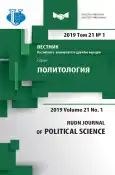POLITICAL PARTIES OF BANGLADESH AND THE CULTURE OF POLITICAL VIOLENCE
- Autores: Md Sazedul I.1
-
Afiliações:
- Peoples’ Friendship University of Russia (RUDN University)
- Edição: Volume 21, Nº 1 (2019)
- Páginas: 129-139
- Seção: CURRENT PROBLEMS OF POLITICAL SCIENCE
- URL: https://medbiosci.ru/2313-1438/article/view/339692
- DOI: https://doi.org/10.22363/2313-1438-2019-21-1-129-139
- ID: 339692
Citar
Texto integral
Resumo
Political parties are crucial for the development of democracy in Bangladesh. They represent interests of different social groups and, by means of participation in elections, affect the development of political and socio-economic power strategies. Thus, political parties provide guarantee of equal rights of all the country’s citizens and contribute to their involvement in the democratic process. The democratic institutions in Bangladesh are represented by 40 officially registered parties, among which the largest and most popular are the Awami League, the Nationalist Party, the Jatiya Party and the Jamaat-i-Islami. The article studies political parties’ participation in the life of the country since the establishment of Bangladesh and compares the four main political parties in terms of their ideology, organizational structure, leadership and popular support during elections. Throughout the country’s political history, the winning party has always enjoyed the monopoly of power, which has contributed to the aggravation of conflict between opposition parties and authorities. This situation significantly hinders the country’s socio-economic development. Strikes, often accompanied by extremist violence, are taking place in different parts of the country. The author uses the historical method to analyze the nature of the opposition of various political forces in Bangladesh.
Sobre autores
Islam Md Sazedul
Peoples’ Friendship University of Russia (RUDN University)
Autor responsável pela correspondência
Email: sazid.ul.islam2010@gmail.com
PhD Student of the Department of Comparative Politics of Peoples’ Friendship University of Russia
Mikhlukho-Maklaya str., 6, 117198, Moscow, Russian FederationBibliografia
- Zalysin I.YU. Violence as a Power Tool: Essence and Political Opportunities. In the Context of Conflict Resolution Studies. Collected articles. Ed. T.M. Dridze and L.N. Tsoi. Moscow: The RAS Institute of Social Studies; 1997; 1. Available from: http://conflictmanagement.ru/ nasilie-kak-sredstvo-vlasti-sushhnost-i-politicheskie-vozmozhnosti. Accessed: 01.02.2018 (In Russ.).
- Kotin I.YU. “Dagger Jihad” in Bangladesh: Cause and Effect. Vestnik Rossijskogo universiteta druzhby narodov. Seriya: Mezhdunarodnye otnosheniya. 2017; Vol. 17; 4: 684—696. doi: 10.22363/2313-0660-2017-17-4-684-696. Accessed: 01.02.2018 (In Russ.).
- A Party as a Political Institution. Available from: http://kulturoznanie.ru/politology/partiyakak-politicheskij-institut/. Accessed: 01.02.2018 (In Russ.).
- Pidzhakov A.YU., Resheckij F.N., Bajramov SH.B. Concept and Meaning of “Political Violence”. Credo New. 2009; 1. Available from: http:intelros.ru/readroom/credo_new/cn_ 1_2009/3540-ponjatie-i-sushhnost-kategorii.html. Accessed: 01.02.2018 (In Russ.).
- Akbar N.T. Outside the Institutional Box: Why Political Parties Use Pre-electoral Violence in Bangladesh. UC Berkeley Electronic Theses and Dissertations; 2016. Available from: https://cloudfront.escholarship.org/dist/prd/../qt3cg365bh. Accessed: 01.02.2018.
- B Suykens I.A. The Distribution of Political Violence in Bangladesh. 2015. Available from: www.psw.ugent.be/../The%20Distribution%20of%20Politic. Accessed: 01.02.2018.
- Bangladesh Political Violence, a Case Study from the 2014 Human Rights and Democracy Report. 12.03.2015. Available from: https://www.gov.uk/../case-studies/bangladesh-politicalviol. Accessed: 01.02.2018.
- Curtis L. Bangladesh’s Fracture: Political and Religious Extremism. Heritage.org. 30.04.2015. Available from: www.heritage.org/testimony/bangladeshs-fracture-political-and-religiousextremism. Accessed: 01.02.2018.
- Lintner B. Religious Extremism and Nationalism in Bangladesh. Available from: apcss.org/ Publications/Edited%20Volumes/ReligiousRadicalism/PagesfromReligiousRadicalismand SecurityinSouthAsiach17.pdf. Accessed: 01.02.2018.
- Masooda B. Allowing for Diversity: State-Madrasa Relations in Bangladesh. Religions and Development Research Programme Working Paper 13 — 2008. Available from: epapers.bham.ac.uk/1548. Accessed: 01.02.2018.
- Mass Arrests in Bangladesh: Round up the Usual Suspects. The Economist. 27.01.2016. Available from: www.economist.com/news/asia/21700669-spate-assassinations-provokes-heavyhanded-response-roundup-usual-suspects. Accessed: 01.02.2018.
- Moniruzzaman M. Party Politics and Political Violence in Bangladesh: Issues, Manifestation and Consequences. South Asian Survey. March 2009. Available from: https://www.researchgate.net/../240717337_Party_Politics_a. Accessed: 01.02.2018.
- Mohsin A.A. Religion, Politics and Security: The Case of Bangladesh. APCSS Studies. 1984; 8: 467—468. Available from: apcss.org/Publications/Edited%20Volumes/ReligiousRadicalism/ PagesfromReligiousRadicalismandSecurityinSouthAsiach20.pdf. Accessed: 01.02.2018.
- Political Violence in Bangladesh: A Comprehensive Study. A Bangladesh Study. 01.10.2014. Available from: http://savebd.org/wp-content/uploads/2016/09/POLITICAL-VIOLENCE-astudy.pdf. Accessed: 01.02.2018.
- Rounaq J. Political Parties in Bangladesh. Centre for Policy Dialogue (CPD) Working Paper 8. 2014. Available from: www.cmi.no/publications/file/5229-political-parties-in-bangladesh.pdf. Accessed: 01.02.2018.
- Rahman M.A. The Forms and Ecologies of Islamist Militancy and Terrorism in Bangladesh. Journal for Deradicalization. 2016; 7: 68—106.
- Suvrota Sh. Human Rights of the Minority in Bangladesh. Blog.mukto-mona.com. 16.03.2016. Available from: https://blog.mukto-mona.com/2016/03/16/48634/. Accessed: 01.02.2018 (In Bengal.).
- The State of Conflict and Violence in Asia. The Asia Foundation. 11.10.2017. Available from: asiafoundation.org/wp-content/uploads/2017/10/StateofConflictandViolenceIntroduction.pdf. Accessed: 01.02.2018.
- World Bank, Bangladesh Development Update. Washington, DC: World Bank; 2015; 3. Available from: http://documents.worldbank.org/curated/en/550801468014652230/Bangladesh development-update-April-2015. Accessed: 01.02.2018.
Arquivos suplementares









